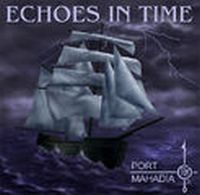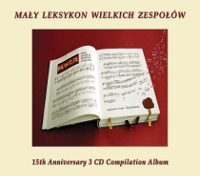 Quite a surprising album, and at the same time very pleasant in reception. Pleasant, because it listens very nicely and we meet some familiar names on it. And surprising, as it came totally unexpected from the Giordano Entertainment (USA) – the company which is still not widely known in progressive circles around the world.
Quite a surprising album, and at the same time very pleasant in reception. Pleasant, because it listens very nicely and we meet some familiar names on it. And surprising, as it came totally unexpected from the Giordano Entertainment (USA) – the company which is still not widely known in progressive circles around the world.
At first listening, this musical project by Port Mahadia, seemed rather fit for Explorer’s Club or Leonardo “project” label than a regular band to me, but in the promotial material sent by the record company the word “band” was not uncommon. So, let’s make it clear: Port Mahadia, headed by two American musicians, Cameron Castle (g) and Erinn Waggoner (bg), who composed the entire material which we hear on Echoes In Time, consists of the two above mentioned plus William O’Connell (k), Rusty Clutts (dr) and – attention please – the eminent violonist connected with Kansas, David Ragsdale, and the cellist, former member of Electric Light Orchestra, Hugh McDowell. What’s most important, however, is that on top of that, there are three vocalists, including Damian Wilson (Threshold). He sings almost all the vocal parts, sometimes accompanied in duet by Natalie Grace Chua, and in two tracks, which appear at the beginning and the end of the album – by Dave Gilbert.
The construction of the album, titles of separate song and a number of the extramusical effects (waves’ noise, singing of the seagulls) proves that we are faced with a concept album, which describes a story of a cruise of the sailing ship from the album’s cover. Unfortunately, I’m afraid I can’t say anything more about this concept, because in a rather poor, four-page only booklet one would seek the lyrics or the summary of the story in vain. However, musically speaking, this concept, alternated with narration (David Lee), is consistent and effective, giving a listener quite a big scope for individual interpretation.
After the spectacular beginning („Prologue”), when we can hear a real instrumental rush with exposed violin and cello sections, the first actual song “Sirens Call” perfectly introduces us to the atmosphere of the album. Wilson’s majestc vocal is as usual superb and later on, as the album develops, he proves to be able to use his voice (which is one of the most interesting in contemporary rock music) exqusitely. Echoes In Time consists of relatively short 4-to-5-minute tracks, which don’t link together, an astonishing fact among concept albums. Even narratives (they seem to be the extracts from the ship’s log) are closed within seperate, closed musical portions. I don’t know what induced the musicians from Port Mahadia to structure their work in that way, but I receive it as a kind of inconvenience during the listening. Only after the only longer epic “I Of The Storm”, placed somewhere near the end of the album, does the music gather momentum, speeding up and creating the mood of the monumental and unlimited musical adventure.
Among the compositions which constitute the album Echoes In Time, we can find both sharp rock songs (great intrumental recording “Horizons”) and the tracks which could easily be labelled “radio friendly” (beautiful melodies in “Times Companion” and “Distant Shores”). We can also come across breakneck displays of instrumentalists’ skills (especially string section, for example in “Riding The Wind”), as well as compositions which will satisfy the orthodox fans of neoprogressive rock (apart from mentioned “I Of The Storm” I draw your attention to “Requiem Of The Mind”). All in all, it appears that on Echoes In Time everybody is bound to find something which would suit themselves, although, frankly speaking, to me the whole album would represent more, had it been a little bit better structured and a trifle more carefully considered. For sure, the whole musical story would have been more dynamic and dramatic. But it might be just that my personal perception insisted on something different during my listening to Echoes In Time. Instead of trying to find fault with the album, I recommend it to all symphatizers of ambitious rock, hinting that there is much more emphasis on solid, melodic playing than on regular prog rock spectacle.
Translation: Katarzyna Chachlowska






